- Home
- Jana Petken
The Errant Flock Page 23
The Errant Flock Read online
Page 23
Sinfa began to sob. Her eyes bore into Isa and then David. Her confusion was being replaced with shock. She stared vacantly, as though lost in a world of her own. She tried to get out of the bed but it was a feeble effort. “I must go home. No, it can’t be … Rabbi Rabinovitch thinks me dead?”
“Yes,” David replied. Rabbi Rabinovitch and his son, Guillermo, had cried like babies at the graveside. Their tears had affected him greatly, for they had been genuine. After the burial, the rabbi had approached him and Paco. Appearing defeated, Rabinovitch had stood before them with a bowed head. “You probably blame me for her death, but God forgive me, I couldn’t help her,” he’d wept. “At least she is at peace. We Jews will soon be thrown out of our own country, and Spain will lose a most worthy race of people. This is a catastrophe … an unholy crime against my race!”
“Rabbi Rabinovitch, Guillermo, and my neighbours? But surely they didn’t bury me without my Jewish rites?” Sinfa said.
Her question surprised David. How she was supposedly buried should be the least of her worries, he thought. Presuming she was in shock, he said in a firm voice, “I told the rabbi that you were infected with a disease and that you had died in your cell. The coffin was nailed shut. Paco and I stood outside your cemetery gates and watched your people bury it in the ground …” David paused. She looked devastated.
“Sinfa, you do understand what this means?” he pushed on. “You cannot be seen alive in Sagrat. No one must know you’re here.”
“But I’m not dead!” Sinfa sobbed, reality finally striking her.
“No, thanks to God, you’re well.”
Isa, holding Sinfa’s hand, shook her head, gesturing to David not to say any more.
David raised his hand to silence her. “No, Mama, she has to know the truth.”
Sinfa wept on, but her eyes never strayed from David’s face. “My life is over in Sagrat, isn’t it?” she asked after a while.
David nodded sadly. “Yes, it’s over.”
“But you will have a new life elsewhere,” Isa said, desperately trying to console her.
“And who will I be in this new life?” Sinfa wept even harder.
David wanted to comfort her, but before he could do that, she had to be aware of the enormity of the situation. “You must understand that my family’s well-being now depends on your willingness to stay hidden. You cannot leave this house. You must not look through an open window, stand at the door, or even think about going into the street. If your presence here is reported to the authorities, you, my entire family, and I will be arrested and put to death.”
After a while, Sinfa wiped her eyes, and let out a long broken sigh. Nodding her head, she finally seemed to understand. “For how long must I be hidden here?” she asked, sounding calmer.
“A few weeks,” David said truthfully. “Maybe longer.”
Chapter Forty-Five
Walking along a particularly foul-smelling street, David and Paco covered their mouths and noses with their hands and picked up their pace. The pathway between the houses was barely wide enough for two doors on opposite sides to open outwards at the same time. There were no drains or sewers nearby, thus this part of town always smelled of decaying meat and human waste.
The street, sloping downwards towards the base of the hill, sat just a stone’s throw away from the town’s slaughterhouse and goat pens, which overlooked the cramped buildings. Animal blood frequently flowed down the hill like a stream, forming red puddles in a dip at the base of stone steps bordering the bottom end of the lane. Worse were the animal innards and other unwanted leftovers that were dumped on an embankment at the top end of the alley, forming thick rotting piles which were eaten by stray dogs roaming the area.
Every so often, David looked up at the top floor windows, praying that wives wouldn’t empty a piss pot at the exact moment he walked underneath them. It was still early, he thought. Everyone would probably still be asleep after the Christmas Eve processions, Mass, and family suppers, which had gone on long into the night.
This was going to be the strangest Christmas he’d even known. If truth be told, no one seemed to be in the mood to celebrate anything apart from one Mass after the other. The townspeople were no doubt praying for an end to the series of murders, which had left them terrified, and who could blame them?
Sighing with relief when they’d left the stench of that street behind them, David asked Paco, “So how long will these night patrols continue?”
“I don’t know. It’s unheard of,” Paco said.
“It seems a bit harsh not allowing people to leave their homes after it gets dark. There’re going to be a lot of unhappy shopkeepers.”
“People are scared, lad, and I’ll wager they’d rather stay indoors than be in the streets at night. My cousin caught a glimpse of Garcia’s dead body. He said it put the fear of God into him. He’s convinced that the evil one is in Sagrat.”
David had heard similar comments from people who’d been at the High Mass. People were barring their doors at night, afraid to sleep or to be alone in a house. Captain Tur and the militia had relentlessly hunted Garcia’s killer, but he was still at large. The soldiers had gone from door to door, questioning people and looking for clues and evidence. New guard posts had been positioned at every entrance into Sagrat. Strangers not known in the town were being interrogated, and every sack in every cart that moved was searched. David wasn’t sure what the militiamen were hoping to find inside sacks of wheat and corn, but at least they were being seen doing something.
“It’s been a week since Garcia’s murder. The militia is on a fool’s errand,” David said, voicing his thoughts. “They’ll never find the person who did it. He’s probably long gone.”
“I disagree. I think the killer lives in Sagrat.”
David’s mind had raced all week with questions he was unable to answer. Like Paco, he too believed that there had to be a connection between Garcia’s death and the murders that he, David, had committed. He had theories, but they posed more questions than answers: Did someone in the town, apart from the duke, know the truth about the infant? Did Garcia have a disagreement with the scar-faced marauder over money, and was he killed because of that? Or did the duke pay someone to murder the treasurer? That theory was, in David’s opinion, the most likely. For a short time, he had even suspected his father and brother, but his father was not capable of murder and wouldn’t butcher a body, not even Garcia’s. Diego didn’t have the stomach to gut a man either. Paco, on the other hand …
David and Paco found Captain Tur in the castle’s north-east courtyard. They had news for him, but before announcing it, they took a moment to observe their fellow militiamen trudging laboriously up the stairs to the battlements with arms loaded with weapons.
“Are we expecting a siege?” Paco said jokingly. “What in the name of God are they all doing?”
David was mesmerised. Tur, looking flustered, was shouting orders at the men. There was nothing new about his barking orders, David thought, but one would be led to believe that an enemy army was advancing on the town, judging by the urgency in his voice.
Looking up at the battlements, David saw longbows, spears, pikes, clubs, and buckets of oil being deposited at various intervals on the wall. In the courtyard, militiamen were red-faced, sweating, and panting with exertion as they moved heavy rocks to the foot of the wall’s stairs. The duke was afraid, David thought. Perhaps he didn’t kill Garcia.
“Why would the duke order the defences to be strengthened?” David asked Paco.
“I’m not sure. Tur must be cursing him. Who does Peráto think he is coming to attack him? No army will be able to scale these walls. The north-east gate is practically impenetrable. It has withstood attempted breaches for the past two hundred and fifty years,” Paco said. “The duke’s private chambers are in this part of the castle. Maybe he’s scared of being bludgeoned to death in his bed. What a favour that would be.”
“If that’s the case, he didn’t have
Garcia murdered,” David suggested.
“Maybe not … Or maybe this is a ploy to cover up his guilt.”
Chapter Forty-Six
Luis cradled Jaime Gaspar in his arms and tried his best to soothe him. In truth, the baby’s cries were comforting in the midst of Josefa’s grating screams and the crashing noise of crockery breaking as it hit the walls, he thought. She was an abomination. Her black soul, straddling hell, was lost to God. She was beyond redemption.
She would never see his son again. He would make sure of that. Whenever the baby had been taken to see her, she had become violent and had threatened to throw him out the window. Even her ladies-in-waiting were terrified of her. She would let no one touch her, and she had not been bathed in days. Soon she’d stink like a diseased old whore whose mossy cave had been poked too many times. And her stench would fill his chambers. Sighing with disgust, he kissed the baby’s forehead and then handed him to the waiting wet nurse. “Keep him away from his mother,” he ordered.
As soon as he was alone, he locked the door and went into his dressing chamber. A heavy oak cabinet, standing as tall as he against one of the walls, had been there since his grandfather’s day. It was a heavy piece of furniture. He broke out in a sweat and strained a muscle every time he had to push it farther along the wall.
Grunting with exertion after moving the cabinet about two feet to the left, he picked up a lit oil lamp and then held it held it in front of an opening in the wall. Totally obscured when the cabinet was in place, the hole was just high and wide enough to allow a man to step through it without having to crouch down. Holding the lamp with one hand, and onto the stone wall with the other, he stepped inside and cautiously descended the stairs, which led to a secret chamber.
Once inside the hidden room, he looked at two leather chests sitting against a wall. They looked the same as the dozens of other treasury chests that had been used to transport money over the years. The duke of Sagrat’s crest was embossed on the sides, and the inside frame was made of wood. These chests had been brought here years ago, and they had been empty at the time of his father’s death, apart from a hundred or so ducats. But over the past eight months, he and the marauders had worked together to fill them to the brim.
He had given the mercenaries the task of raiding caravans whilst he pilfered Sagrat’s vaults with Garcia’s help. Little by little and one small sack at a time, money had left the municipal palace and had ended up in these chests, and no one had ever been the wiser. After lifting a handful of silver and gold maravedis, reals, and ducats, he tipped his palm downwards and watched the coins trickle back into the chest, making that wonderful jingling sound that he loved so much.
There still wasn’t enough money to buy the political power he needed to become Valencia’s next viceroy, he thought on reflection. To have a chance at that seat, he would have to bribe noblemen and council members across the region, for nominations from his peers would be the only way to convince the king and queen that he was the right man for the position.
After pulling one of the chests along the wall, another opening was revealed. Waist high and just wide enough to take a man’s girth, a tunnel extended as far as the castle’s north-western side, exiting halfway up the shallowest part of the hill. It was the only part of the hill that did not require a defensive wall. There, the castle’s back facade was at its highest. There were no windows and no doors. It stood like a giant wall, flanked by battlements on either side.
The tunnel’s exterior exit was well hidden within dense vegetation and rocks, and it was covered by a heavy iron grill which could be opened from the outside. It was a sewage outlet of sorts, for halfway along the tunnel, a tributary carrying waste from the barracks flowed into its main pathway.
A short time after Luis had removed the iron grate that cased the opening inside the secret chamber, he heard a man’s heavy breathing and the sound of knees and hands scuffling along the tunnel’s dirt and rock floor. “You’re late,” he whispered into the tunnel.
Alejandro crawled out, stood up, and stretched his muscles. Stinking like shit, he grunted with disgust. “Better late than never. Why don’t you crawl through that filth the next time?” he said.
“It’s been awhile, Alejandro. It’s good to see you, my friend,” Luis said, giving Alejandro a slap on the back.
“It’s been too long, Luis. I was surprised and troubled when I received your message. It’s not like you to contact me unless it’s absolutely necessary.”
“It was.” Pointing to a chest, Luis gestured Alejandro to sit. “Are you sure no one followed you from the caves or saw you on the hill?”
“I’m sure.”
Nodding, Luis said, “Garcia’s dead. Someone cut him into pieces … Was it you?”
Alejandro did not seem at all saddened by the news, but he did appear to be taken aback by the question. “No, I had no need to kill him. He was a useful messenger.”
Luis sighed with relief. “I had to ask. I’m baffled by his murder.”
“It doesn’t surprise me that someone would want him dead,” Alejandro said.
“Why do you say that?”
“The man was careless with his tongue. I didn’t trust him. I had no way of knowing if I was following your orders or his. He was not fond of you, Luis, and I doubt he was completely loyal. He tried to pit me against you. Said we could take a bigger share of the money and you would never know. Who knows what enemies he had.”
“Bastard … Still, his death is unfortunate.”
“You have no clues?”
“No, only my own suspicions,” Luis said.
“What do you know of a man named Sanz?” Alejandro asked. “Could it be him? Garcia sent me to kill him.”
Luis’s heart was racing. Garcia … the useless, disobedient fool. Did he tell Alejandro why he wanted Sanz dead or about the infant? No, Luis thought, if Alejandro knew, he would have said something about it. “What did Garcia tell you about the man?” Luis asked.
“Only that he posed a threat to our mission.”
Luis felt relief spread through his body. Shaking his head, he said, “If Garcia wanted you to assassinate this man, it was probably because he had a personal vendetta.”
Looking furious, Alejandro said, “Garcia didn’t tell me that Sanz was skilful with a blade. He gave me quite the dual.”
“Why did you not kill him?”
“I could have ended him had a neighbour not split my head with a log.” Touching the back of his head, Alejandro added, “It was not the first time I’d encountered Sanz.”
“What? What do you mean?”
“He was at one of the farms we torched. He wanted to fight five of us. There he was, surrounded, trying to protect his father and a small girl with nothing but a sword in his hand and hatred flashing in his eyes. I have to admire his fire and passion. He’s no coward.”
Thoughts crashed into Luis’s mind. Shit! Shit and pox! That bastard Sanz was at the farm. His eyes widened as an even darker thought crossed his mind. Sanz had no sister, which could only mean … No, it was impossible.
Luis could barely think straight. All he could hear in his mind was a voice screaming, The girl is alive! Sanz didn’t kill her! Taking a long breath, he forced his mind to concentrate on Alejandro and the matter at hand. He would think about killing Sanz after Alejandro had left. He would think of nothing else!
Spreading out a map on top of a trunk, he said, “Garcia is a loss, but he was not indispensable. I’ve had to adjust our plans, but when I tell you about my proposal, I think you’ll agree that not only will it work, but also that we’ll be even richer than we first anticipated.”
“How many days do we have to prepare?”
“Ten.”
“Then you had better tell me everything, down to the finest detail.”
Nodding in agreement, Luis said, “Prepare well. This is the last time we will see each other until after the auto-de-fé.”
After Alejandro left the chamber through t
he tunnel, Luis locked the inner tunnel’s grate and then pushed the trunk back to its original position against the wall. He loved Alejandro better than he loved his brothers. Yet not even Garcia had known about their friendship or that they had even met. Secrecy was their most powerful ally, and it had served them well for the past year.
Before his father’s death, Luis had spent a great deal of time in Valencia. He often wondered why he’d gone to a particular part of the city one night. He knew that the very worst of men inhabited it. Overcrowded streets swarming with rapists, murderers, swords for hire, blackguards, and thieves was not a place he would ever want to visit. Not even the Inquisition wished to show its face there. He could only put his exuberant curiosity to explore down to being overly inebriated on grape wine.
Picturing Alejandro’s long ragged facial scar inflicted upon him that night, Luis was reminded that he would have died had it not been for Alejandro’s timely intervention. He could still feel the excruciating pain from lying on the ground and being kicked repeatedly by three thieves who’d already stolen the clothes from his back. There had been so much blood in his eyes that he thought he’d been blinded. Alejandro, appearing from nowhere, had rushed head down towards the men like a bull, intent on gouging into their flesh. He had fought like a demon from hell, killing two of the attackers and leaving the other on the ground begging for mercy.
Chapter Forty-Seven
Walking into the courtyard, Luis was met by militiamen forming to escort him to the church of San Agustin for the Christmas Day Mass. Earlier he’d ordered Tur to have four cavalrymen and eight militiamen ready to move at all times. From now on, he wouldn’t leave the castle unless surrounded by battle-ready guards, he’d told Tur. With a killer still at large, he trusted no one but his own soldiers … In truth, he feared David Sanz.

 Blood Moon
Blood Moon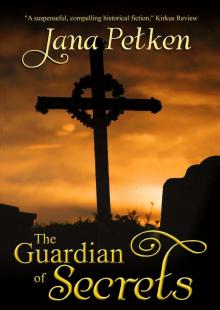 The Guardian of Secrets and Her Deathly Pact
The Guardian of Secrets and Her Deathly Pact Dark Shadows
Dark Shadows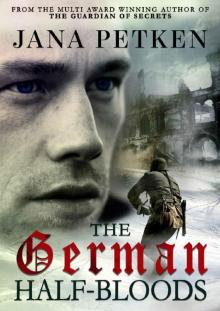 The German Half-Bloods (The Half-Bloods Trilogy Book 1)
The German Half-Bloods (The Half-Bloods Trilogy Book 1) Swearing Allegiance (The Carmody Saga Book 1)
Swearing Allegiance (The Carmody Saga Book 1)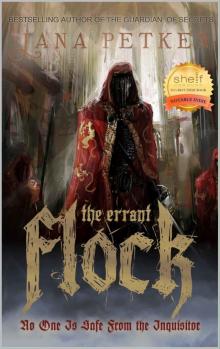 The Errant Flock
The Errant Flock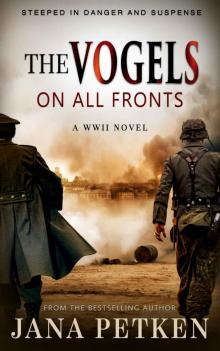 The Vogels: On All Fronts (The Half-Bloods Trilogy Book 2)
The Vogels: On All Fronts (The Half-Bloods Trilogy Book 2)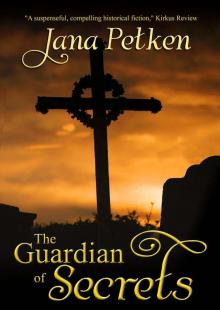 The Guardian of Secrets
The Guardian of Secrets Before The Brightest Dawn (The Half-Bloods Trilogy Book 3)
Before The Brightest Dawn (The Half-Bloods Trilogy Book 3) Blood Moon (The Mercy Carver Series Book 2)
Blood Moon (The Mercy Carver Series Book 2) Dark Shadows (The Mercy Carver Series Book 1)
Dark Shadows (The Mercy Carver Series Book 1)